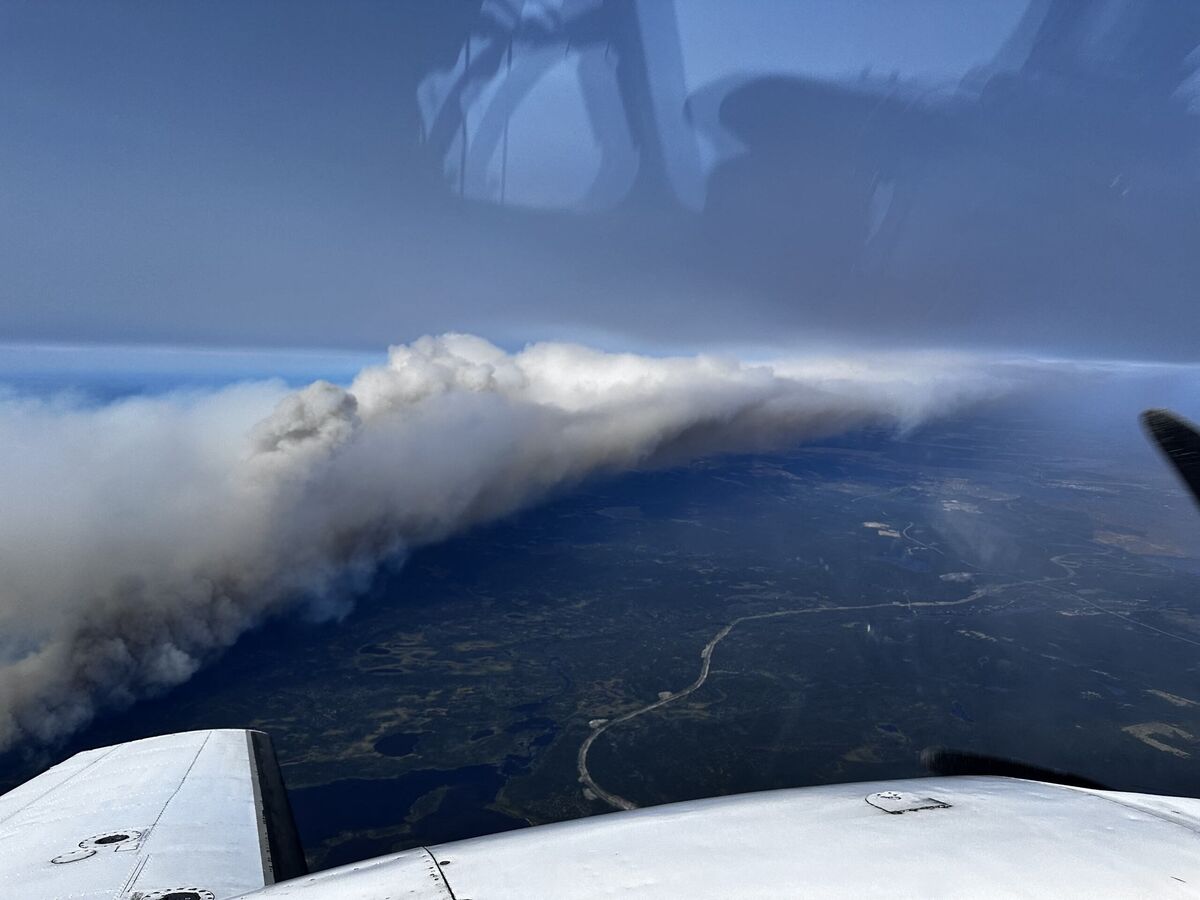Wildfires In Alberta: The Impact On Oil Output And The Energy Sector

Table of Contents
Direct Impacts of Wildfires on Oil Production
Wildfires pose a significant and direct threat to Alberta's oil production capabilities, impacting both extraction and transportation. The consequences are far-reaching and costly, impacting not only the oil sands industry but the entire energy sector.
Damage to Oil Sands Operations
Oil sands operations, characterized by extensive infrastructure and open-pit mining in sensitive ecosystems, are particularly vulnerable to wildfires. The risk of direct fire damage is substantial, leading to equipment destruction, operational shutdowns, and substantial financial losses.
-
Examples of Past Impacts: The 2016 Fort McMurray wildfire, for instance, forced the evacuation of entire oil sands communities and caused significant damage to infrastructure at sites like Suncor's Base Mine and Syncrude's Mildred Lake facility. These shutdowns resulted in millions of barrels of lost oil production and billions of dollars in economic losses.
-
Key Impacts of Wildfires on Oil Sands Operations:
- Disruption of extraction processes: Wildfires can directly damage extraction equipment, halting production and necessitating costly repairs or replacements.
- Damage to pipelines and infrastructure: Pipelines, processing plants, and other crucial infrastructure are vulnerable to fire damage, leading to spills, leaks, and extended operational downtime.
- Loss of workforce due to evacuations: Mandatory evacuations during wildfires disrupt operations, resulting in lost productivity and increased safety concerns for workers.
- Increased insurance costs: The heightened risk of wildfire damage translates to significantly higher insurance premiums for oil sands operators.
Disruption of Pipeline Networks
The extensive network of pipelines transporting oil and natural gas across Alberta is also highly vulnerable to wildfires. Pipeline shutdowns, whether precautionary or due to direct damage, lead to immediate reductions in oil output and significant delivery delays.
- Consequences of Pipeline Disruptions:
- Temporary and permanent pipeline closures: Wildfires can necessitate immediate pipeline closures for safety reasons, often lasting for days or even weeks, resulting in substantial production losses. In some cases, damage may be so extensive that pipelines require permanent decommissioning and replacement.
- Increased transportation costs: When pipelines are shut down, oil producers must rely on alternative transportation methods, like trucking, which are considerably more expensive and less efficient.
- Supply chain disruptions: Reduced oil and gas delivery creates significant supply chain disruptions, impacting downstream industries and consumers.
- Increased risk of oil spills: Wildfire damage to pipelines increases the risk of oil spills, which have devastating environmental and economic consequences.
Indirect Impacts on the Alberta Energy Sector
The impacts of wildfires on Alberta's energy sector extend beyond the direct damage to infrastructure. Significant indirect effects ripple through the economy and environment, creating long-term challenges.
Economic Consequences
Reduced oil production due to wildfires has profound economic consequences for Alberta. These include job losses, decreased government revenue, and a negative impact on investor confidence.
- Economic Ripple Effects:
- Decreased GDP growth: Reduced oil production directly impacts Alberta's GDP, slowing economic growth and impacting overall prosperity.
- Job losses in the energy sector and related industries: Operational shutdowns and reduced production lead to job losses not only in oil and gas extraction but also in related industries like transportation, manufacturing, and services.
- Reduced provincial and federal tax revenue: Lower oil production translates to reduced tax revenue for both provincial and federal governments, impacting public services and infrastructure investment.
- Impact on investor confidence: The increased risk of wildfire damage and operational disruptions negatively impacts investor confidence in the Alberta energy sector.
Environmental Concerns beyond Immediate Fire Damage
The environmental consequences of Alberta wildfires extend far beyond the immediate destruction caused by the flames. Long-term impacts on air and water quality, biodiversity, and land degradation pose significant challenges.
- Long-term Environmental Damage:
- Air pollution from smoke and combustion: Wildfire smoke contains harmful pollutants that negatively impact air quality, affecting human health and ecosystems.
- Water contamination from ash and runoff: Ash and other wildfire debris can contaminate water sources, affecting drinking water supplies and aquatic ecosystems.
- Habitat loss and biodiversity reduction: Wildfires destroy crucial wildlife habitats, leading to habitat loss and a reduction in biodiversity.
- Increased greenhouse gas emissions (both directly and indirectly): Wildfires directly release significant amounts of greenhouse gases. Furthermore, the increased reliance on alternative transportation methods to compensate for pipeline shutdowns contributes indirectly to greenhouse gas emissions.
Conclusion
The devastating effects of Alberta wildfires on oil production and the broader energy sector are undeniable. From direct damage to infrastructure and operational disruptions to significant economic and environmental repercussions, the consequences are far-reaching and demand careful consideration for future mitigation strategies. The interconnectedness of the energy sector and the environment underscores the need for proactive measures to minimize wildfire risks and enhance resilience within the industry.
Call to Action: Understanding the impact of wildfires on Alberta's oil output and energy sector is crucial for developing effective strategies for prevention, mitigation, and response. Learn more about wildfire prevention measures and support initiatives to protect Alberta’s valuable energy resources and its environment. Stay informed about the ongoing impact of Alberta wildfires on the energy sector and advocate for policies that prioritize both environmental protection and economic stability.

Featured Posts
-
 Trumps Plan B New Tariff Strategy After Court Decision
May 31, 2025
Trumps Plan B New Tariff Strategy After Court Decision
May 31, 2025 -
 Tour Of The Alps 2024 Team Victoriouss Bid For Success
May 31, 2025
Tour Of The Alps 2024 Team Victoriouss Bid For Success
May 31, 2025 -
 Nyt Mini Crossword Thursday April 10 Clues And Solutions
May 31, 2025
Nyt Mini Crossword Thursday April 10 Clues And Solutions
May 31, 2025 -
 Bernard Kerik From 9 11 Hero To Convicted Felon
May 31, 2025
Bernard Kerik From 9 11 Hero To Convicted Felon
May 31, 2025 -
 Covid 19 Jn 1 Variant In India Staying Safe Amidst The Outbreak
May 31, 2025
Covid 19 Jn 1 Variant In India Staying Safe Amidst The Outbreak
May 31, 2025
